|
|
|
Sort Order |
|
|
|
Items / Page
|
|
|
|
|
|
|
| Srl | Item |
| 1 |
ID:
089223
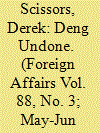

|
|
|
|
|
| Publication |
2009.
|
| Summary/Abstract |
The year 2008 marked the 30th anniversary of the beginning of market reforms in China -- and perhaps the third anniversary of their ending. Since the present Chinese leadership took power, market-oriented liberalization has been minor. And as such policies have wound down, they have been supplanted by renewed state intervention: price controls, the reversal of privatization, the rollback of measures encouraging competition, and new barriers to investment.
|
|
|
|
|
|
|
|
|
|
|
|
|
|
|
|
| 2 |
ID:
089279
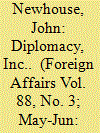

|
|
|
|
|
| Publication |
2009.
|
| Summary/Abstract |
The area around K Street in Washington, D.C., abounds with lobbyists, many of whom represent foreign governments or entities. Although some major foreign governments continue to work mainly through their embassies in Washington, nearly one hundred countries rely on lobbyists to protect and promote their interests. The subculture of public relations and law firms that do this kind of work reflects a steady decline and privatization of diplomacy -- with an increasing impact on how the United States conducts its own foreign policy.
|
|
|
|
|
|
|
|
|
|
|
|
|
|
|
|
| 3 |
ID:
089281
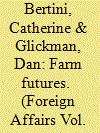

|
|
|
|
|
| Publication |
2009.
|
| Summary/Abstract |
It is not easy for Americans to understand the starvation that afflicts much of the developing world. Families in the poorest parts of Africa and Asia spend up to 80 percent of their incomes on food; for the average U.S. household, that would mean an annual grocery bill of $40,000. Yes, there are hungry Americans in the millions, and the U.S. food-stamp program is operating at record levels. But hunger in the United States does not put tens of thousands of infants into hospitals and require them to be hooked up to feeding tubes. Nor does it lead to stunting, wasting, and debilitating forms of malnutrition, such as kwashiorkor and marasmus.
|
|
|
|
|
|
|
|
|
|
|
|
|
|
|
|
| 4 |
ID:
089222


|
|
|
|
|
| Publication |
2009.
|
| Summary/Abstract |
It took just one month for U.S. President Barack Obama's foreign policy team to establish its line on China: more cooperation on more issues more often. As Secretary of State Hillary Clinton enthusiastically declared during her brief visit to Beijing in late February, "The opportunities for us to work together are unmatched anywhere in the world."
|
|
|
|
|
|
|
|
|
|
|
|
|
|
|
|
| 5 |
ID:
089282


|
|
|
|
|
| Publication |
2009.
|
| Summary/Abstract |
On January 7, 2009, after an unexpectedly severe disagreement between Russia and Ukraine, ostensibly over natural gas prices, Moscow cut off gas supplies to Ukraine. Then, Ukraine did the same to Europe. European reserves soon dwindled, and with neither Russia nor Ukraine willing to give in, it took intense European pressure to lead both parties to reach a compromise agreement, which they did on January 18. Russia got higher prices for its gas, and Ukraine got a modest price rise in 2009, relative price stability, and favorable terms for gas transit costs.
|
|
|
|
|
|
|
|
|
|
|
|
|
|
|
|
| 6 |
ID:
089283
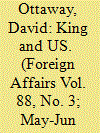

|
|
|
|
|
| Publication |
2009.
|
| Summary/Abstract |
As World War II was drawing to a close in February 1945, U.S. President Franklin Roosevelt and Saudi King Abdul Aziz ibn Saud met aboard a U.S. battleship in the Suez Canal for the first time. For nearly six decades afterward, the United States and the Kingdom of Saudi Arabia enjoyed an unusually close relationship. U.S. companies, which had discovered black gold in the Saudi desert in the early 1930s, built the kingdom into the world's leading petroleum exporter and a major source of oil for the U.S. market. The Saudis, in turn, made their territory and military facilities available to U.S. forces in order to assure U.S. protection of the House of Saud.
|
|
|
|
|
|
|
|
|
|
|
|
|
|
|
|
| 7 |
ID:
089225
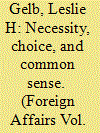

|
|
|
|
|
| Publication |
2009.
|
| Summary/Abstract |
The United States is declining as a nation and a world power, with mostly sighs and shrugs to mark this seismic event. Astonishingly, some people do not appear to realize that the situation is all that serious. A few say it is serious and hopeless. I count myself among those who think it is most serious yet reversible, if Americans are clear-eyed about the causes and courageous about implementing the cures.
|
|
|
|
|
|
|
|
|
|
|
|
|
|
|
|
| 8 |
ID:
089284
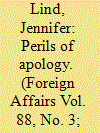

|
|
|
|
|
| Publication |
2009.
|
| Summary/Abstract |
More than 60 years after the end of World War II, chilly relations in East Asia stand in stark contrast to the thaw in western Europe. Germans have spent decades confronting and atoning for the crimes of the Nazi era. Today, Germany is welcomed as a leader in trade and diplomacy, and its military forces fight alongside those of its allies in UN and NATO operations. In 2004, the former Allies invited German Chancellor Gerhard Schröder to the 60th anniversary commemoration of the Normandy invasion. Standing beside the leaders of Germany's former adversaries, Schröder celebrated the day as the anniversary of Germany's liberation from fascism. French newspapers, featuring photos of the French and German leaders embracing, proclaimed it "the last day of World War II."
|
|
|
|
|
|
|
|
|
|
|
|
|
|
|
|
| 9 |
ID:
089224
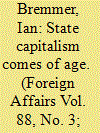

|
|
|
|
|
| Publication |
2009.
|
| Summary/Abstract |
Across the United States, Europe, and much of the rest of the developed world, the recent wave of state interventionism is meant to lessen the pain of the current global recession and restore ailing economies to health. For the most part, the governments of developed countries do not intend to manage these economies indefinitely. However, an opposing intention lies behind similar interventions in the developing world: there the state's heavy hand in the economy is signaling a strategic rejection of free-market doctrine.
|
|
|
|
|
|
|
|
|
|
|
|
|
|
|
|
|
|
|
|
|